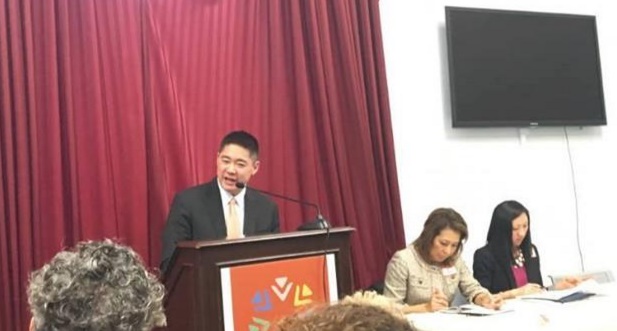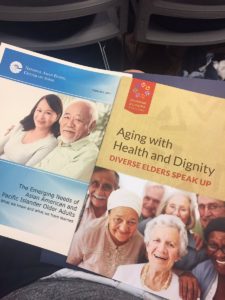by Brianna Brown
February 23, 2017 was a busy day for the National Asian Pacific Center on Aging (NAPCA) and an important day for making the voices of Asian American and Pacific Islanders (AAPI) heard. Dr. Wesley Lum, President and CEO of NAPCA, spoke at the Diverse Elders Coalition (DEC) Congressional Briefing in Washington D.C., while NAPCA staff attended the annual Asian Pacific Island Coalition AAPI Washington State Legislative Day. Both events centred on the steps that need to be taken to address the unique needs of a culturally, linguistically, and ethnically diverse AAPI community.

Dr. Lum makes remarks at “Aging with Health and Dignity: Diverse Elders Speak Up,” Feb 23, 2017. Photo courtesy of NCAPA.
The Congressional Briefing coincided with DEC’s release of a new report entitled “Aging with Health and Dignity: Diverse Elders Speak Up.” The report outlines the main findings from the Administration for Community Living (ACL) public comments submitted by DEC partners. The ACL was created in 2012 by the U.S. Department of Health and Human Services to serve as the federal agency responsible for increasing access to community support while focusing attention and resources on the unique needs of older Americans and people with disabilities across their lifespan. DEC was able to gather nearly 5,000 comments during the public comment period, which will help inform state plans to serve the aging population under the Older Americans Act.

New reports from NAPCA and the DEC. Photo courtesy of LEAD Coalition.
At the Congressional Briefing, Dr. Lum highlighted one of the main themes that came out in the comments collected by the coalition: meeting the unique needs of AAPI older adults by accurately identifying who these communities are. Dr. Lum noted that in the U.S., the AAPI category accounts for 25 ethnicities speaking over 50 different languages. If all of the information collected about AAPIs is aggregated, then meaningful differences are obscured. For example, while Hmong Americans have one of the highest poverty rates of any group in the nation, Malaysian Americans have an average income of over $90,000. These differences are made invisible when we only collect data on an aggregated “Asian” population. State plans under the Older Americans Act need to include ways of collecting disaggregated data to ensure that AAPI older adults are being accurately and adequately represented in planning, evaluation, and resource allocation.
Meanwhile on the same day in Olympia, WA, more than 2,000 community leaders and activists attended the AAPI Legislative Day. This state-wide rally was an opportunity to hear from Governor Jay Inslee and meet with legislators to discuss issues of concern to AAPI communities. The main areas of advocacy included equal access to safety net services, culturally competent and linguistically accessible health and human services, and civil and human rights.
These two events were important opportunities to inform policy makers of the specific needs of AAPI older adults. NAPCA, along with its partners like DEC and APIC, will continue to advocate on behalf of diverse communities at the federal, state, and local levels to ensure that policies adequately represent and equitably serve all individuals, regardless of their race, ethnicity, age or the language they speak.
The opinions expressed in this article are those of the author and do not necessarily reflect those of the Diverse Elders Coalition.

